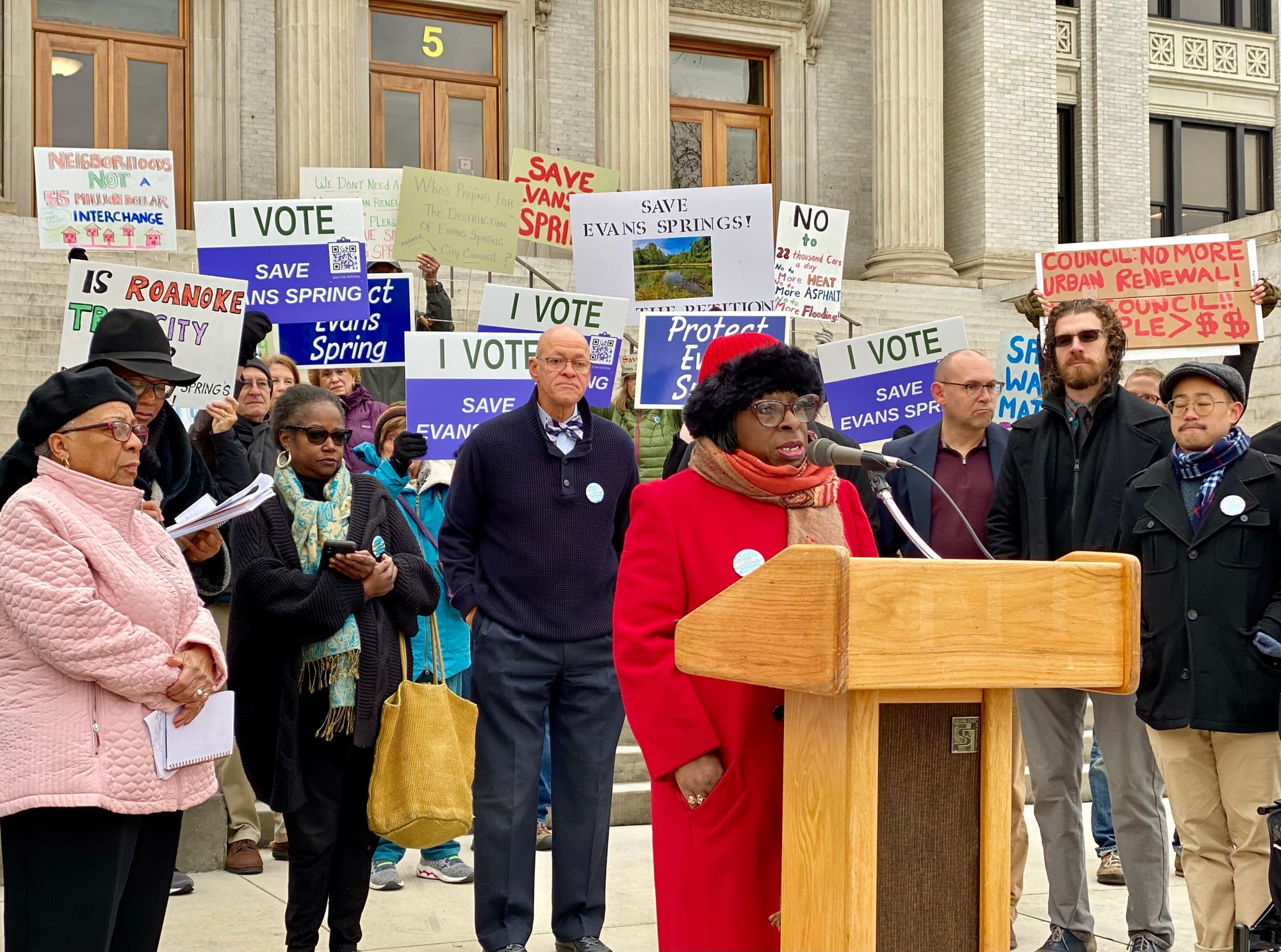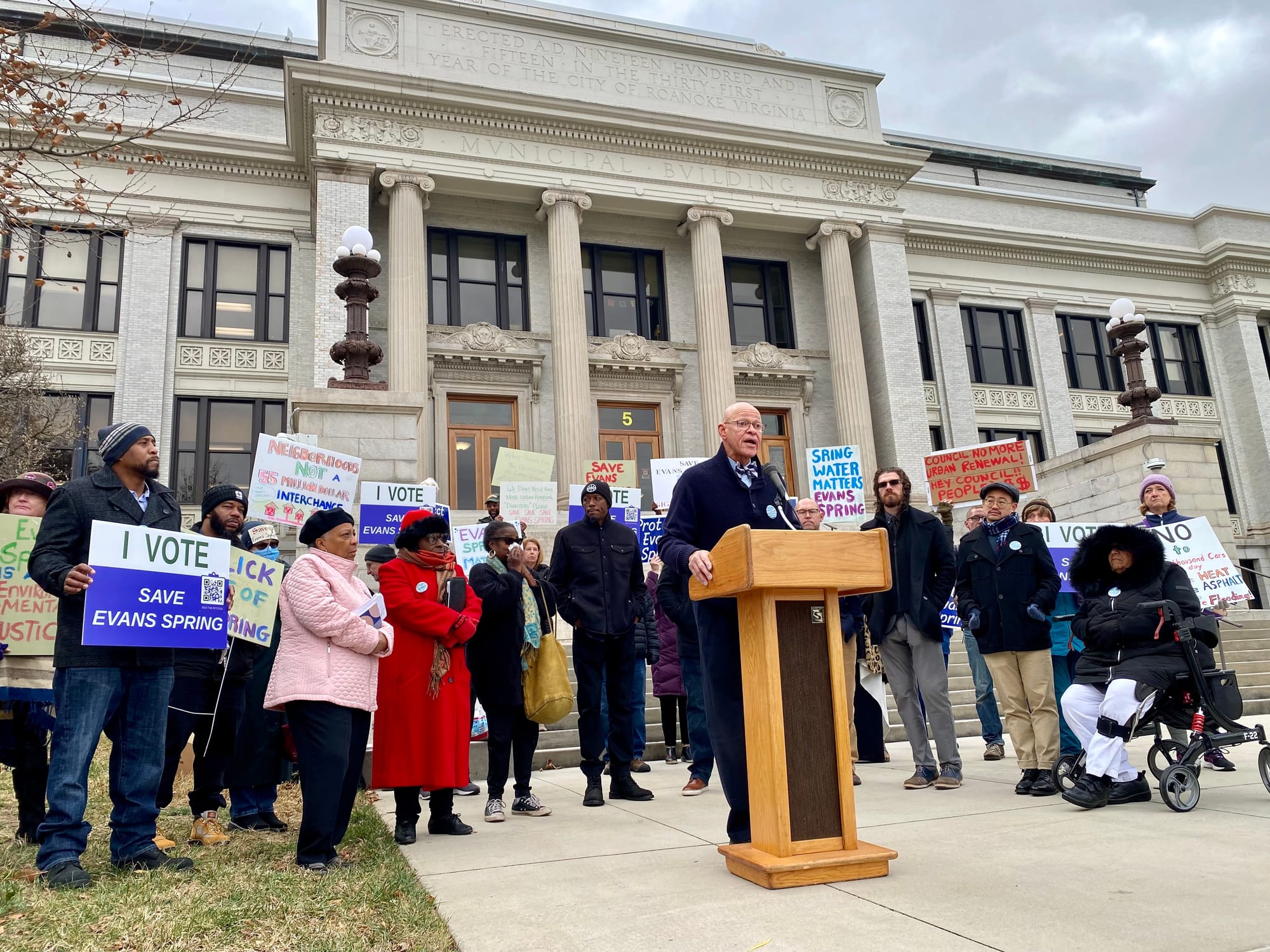As Evans Spring Plan Proceeds, Residents Urge Roanoke Council To Reverse Development Stance
Northwest Roanoke residents and activists said the city should acquire the 150-acre woodlands and turn it into a public park.

Northwest Roanoke residents and activists called on city leaders this week to reverse their position on turning Evans Spring into a residential and commercial development.
The pushback came as consultants just completed a master plan for the privately-owned 150 acres of woodlands across Interstate 581 from Valley View Mall.
That concept plan calls for a developer to construct big box stores, smaller retail shops and more than 600 housing units — including a mix of single-family homes and apartments. Consultants say a project of that size could create hundreds of jobs and bring millions of dollars in tax revenue to city coffers. But it needs city government help to make it happen.
Residents in the predominantly Black neighborhoods around Evans Spring have long resisted development, some saying they see that as a modern-day version of urban renewal.
About 30 people gathered Monday on the steps of the municipal building for a press conference organized by the community group Friends of Evans Spring.

Activists invoked the city’s history of racism and expressed concerns that commercial development on the land would harm the climate, environment and public health.
“We do not want or need more unnecessary, irresponsible development that degrades our environment and lowers our quality of life,” said resident Nadirah Wright. “Let it be known that we, the Friends of Evans Spring, we support thoroughly revitalizing existing vacant commercial and industrial sites.”
Delvis “Mac” McCadden, who served one term on City Council in the early 1990s, said Council is ignoring residents of the Melrose-Rugby neighborhood that sits just south of Evans Spring.
“One of the problems that exists is that there's no one in our government who is responsible for that neighborhood,” McCadden said. “Common sense tells me that we need to listen to the citizens who live there. Until that happens, and until … all seven [Council members] are responsible for that neighborhood, we're in dire trouble.”
A city webpage about Evans Spring describes two “major decision points” ahead if the property is to be developed as the master plan suggests: A rezoning of the land and a funding plan to build a bridge to the I-581 interchange, which consultants say will cost more than $55 million.
But Chris Chittum, who leads the city’s planning department, said Monday that city staff will first brief members of the Planning Commission next month.
“We would not support moving ahead with a rezoning application or interchange funding strategy at this point,” Chittum said in an email. “An intermediate step may involve adoption of the plan as a component of the comprehensive plan.”
A similar process played out Monday with the city’s draft Climate Action Plan, which the Planning Commission recommended on a 3-1 vote be folded into the city’s main planning guide.
Theo Lim, an assistant professor of urban affairs and planning at Virginia Tech, has partnered with city officials on a study exploring how residents are coping with rising urban heat, which climate change is making worse.
He noted at Monday’s gathering that some neighborhoods in Northwest Roanoke can be 10 to 15 degrees hotter than in other parts of the city, in part because of a less robust tree canopy.
“Using planning and policy to protect Roanoke’s tree canopy, especially in areas like Northwest, where residents are most at risk of the consequences of extreme heat, is extremely important,” Lim said. “The forest in Evans Spring is playing an important cooling role for the city's most vulnerable, and this needs to be recognized in any decision to develop the area.”
The city’s history of urban renewal was also a major theme.
Carolyn Hubbard recalled how beginning in the 1950s new development in the name of progress — I-581, the civic center, the post office — destroyed Black neighborhoods. The city used eminent domain to take homes and razed churches, businesses and moved bodies out of a Old Lick Cemetery.
“I think we should use eminent domain at this point to save the land. Vote no for urban renewal. Vote no for commercial rezoning,” Hubbard said. “Don't let money destroy a neighborhood, a community.”
Councilman Luke Priddy was the lone Council member to attend Monday’s event.
“We have to consider the rights of the people who own the property who have the right to develop it as it's currently zoned,” Priddy told reporters.
“But my statement has always been any change to that should only be if it’s a benefit to the neighborhood, and I don't know that these plans are,” he said, referring to the development ideas in the master plan.
Last year, the city, Roanoke’s Economic Development Authority and the property owners agreed to spend up to $225,000 for such a plan.
Four members of the seven-person City Council said during the 2022 campaign that they opposed rezoning the land for businesses. That hypothetical question has gained new urgency with the completion of a master plan meant to guide development.
The last time a serious proposal to develop Evans Spring came before city leaders was in 2019, when Pavilion Development Company proposed 300 apartment units, an office building, a wholesale warehouse club, a restaurant and a golf-related recreational facility.
Speculation at the time was that Topgolf and Costco would be a part of the complex.
A month before the pandemic, however, Pavilion withdrew its plans, citing skepticism expressed by the city’s planning commissioners, who are appointed by City Council.

